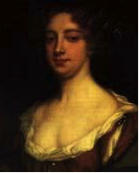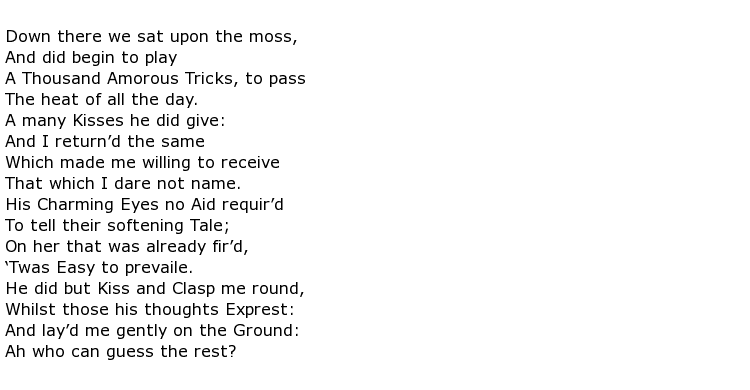 In 17th century England, coinciding with the Restoration of the monarchy, there were a number of artists and writers around and Aphra Behn stands out in this company. She was, most certainly one of the first female writers to make her mark in English literature. She wrote a number of plays, poems and novels and, perhaps shocking to society at that time, some of her romantic pieces went a little further than may have been considered “correct” at that time. She delved into the passions generated by physical love. Her apparent obsession with the sexual liberation of women has led to her recognition in modern times, by feminist and lesbian groups, as a major and positive influence on their thinking.
In 17th century England, coinciding with the Restoration of the monarchy, there were a number of artists and writers around and Aphra Behn stands out in this company. She was, most certainly one of the first female writers to make her mark in English literature. She wrote a number of plays, poems and novels and, perhaps shocking to society at that time, some of her romantic pieces went a little further than may have been considered “correct” at that time. She delved into the passions generated by physical love. Her apparent obsession with the sexual liberation of women has led to her recognition in modern times, by feminist and lesbian groups, as a major and positive influence on their thinking.
It is generally thought that she was born in July 1640 in the village of Wye, not far from Canterbury. Her parents were not well off but Aphra’s mother was employed as a nurse to a notable local family called Culpepper. She was able to have her daughter with her while at the Culpepper residence, thus exposing Aphra to a finer way of living than their own circumstances allowed. Indeed, she got so close to the other children that one of them, Thomas, was reported to have described Aphra as his “foster sister”.
She had a Catholic background while growing up and, at one time, thought she might become a nun. Her allegiances were bound to raise some suspicion, especially during the latter part of the 17th century when anti-Catholic feelings were running high and many were being brutally persecuted for their faith. Before this though, when she was aged 23, Aphra made a trip that was to have huge significance on her way of thinking and her writing. Visiting the Suriname region of Venezuela she came into close contact with the African slave trade and she described this traumatic experience in her book Oroonoko. Such were her descriptive powers that readers in England were able to gain a sense of the wicked nature of slavery, possibly for the first time.
England was becoming a country divided by political allegiances, and inevitably Behn took the Tory side. As a staunch supporter of the restored King Charles II she often attacked the “other side” – the parliamentary Whigs – in writing, mainly focussing on their reluctance to fund the emerging monarchy. Here is an example of such an attack:

She soon came to the attention of the Royal court and found herself involved in espionage in Antwerp. The second Anglo-Dutch war had broken out and it was known that certain English exiles in Belgium were plotting against the King, and it was Aphra’s task to uncover these plots. Sadly though she was never paid for this work and ended up in a London debtor’s prison. Fortunately someone anonymously bailed her out of there and, in 1670, her professional writing career got underway. She wrote a number of plays and poems, as well as short articles. Well known pieces from this time were The Rover, Love-Letters Between a Nobleman and His Sister, and the afore mentioned Oroonoko. A good example of her free, somewhat risqué, style of writing was The Willing Mistress and an extract from it is below:

Aphra Behn died on the 16th April 1689 having (in her own words) led a “life dedicated to pleasure and poetry.” She was 48 years old.

